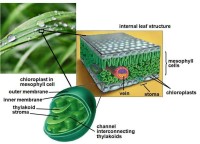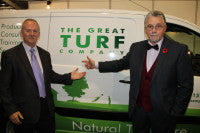The Revolution of Turf Care
 The Journey Begins…
The Journey Begins…
This natural turf care revolution began in 1964, when Ian MacMillan was first introduced to feeding grass with agricultural molasses. An agronomist had advised the golf club at which Ian was a 15 year old greenkeeper to withhold all NPK on the greens. It was then that Ian was introduced to using a thick treacle-like molasses to improve the quality of the greens.
Intrigued, Ian studied the properties of sugars and, over the following 40 years, experimented with a wide range of sugar solutions. One notable success was when, soon after starting as Course Manager at Murrays Hall, Perthshire, a leading turfgrass agronomist made a visit and commented on one green that could not seem to grow grass. "Come back in six weeks", Ian said, "and I will have grass on that green". Collecting the slops from the bar, he sprayed a mix of beers onto the troubled area. On returning to the course six weeks later, the agronomist was amazed to see a healthy cover of turf.
Despite this successful use of beers, Ian discovered that the crucial property of sugars used for turfgrass growth is actually the six carbon sugar produced by photosynthesis.
 It all starts with photosynthesis…
It all starts with photosynthesis…
Most turf managers understand that nutrients from fertilisers are required by plants for healthy growth and development, but may not realise that fertilisers are not really plant food. Plants make their own food through photosynthesis, a chemical reaction in leaves involving water, carbon dioxide (CO2) and light energy.
Photosynthesis is a complex series of chemical reactions involving a transition in forms of energy. The process uses light energy to make food and is a process by which plants make organic compounds from simple inorganic compounds using energy from the sun.
CO2 enters the plant via cells called stomata, located in grass leaves, and reacts with ribulose biphosphate (RuBP), a reaction that is catalyzed by an enzyme called ribulose 1,5-biphosphate, or RUBISCO. Up to 50% of nitrogen within turf is contained within this enzyme. The carbon and oxygen are combined with hydrogen to form carbohydrates. The end product is a hexose sugar; a carbohydrate.
Carbohydrates have three main uses:
- Drive all the processes that result in increased growth
- Energy storage, for use when the grass cannot photosynthesise, for example under environmental stress or excessive use
- Feeding soil microbes by excretion through the plant leaf and roots
It can therefore be concluded that healthy growth is not possible without photosynthesis and carbohydrate production. The rate of natural photosynthesis is affected by:
- Light: limited light, often found in modern stadia and golf courses, slows the rate of photosynthesis
- Temperature: extended heat causes a condition called photo-respiration, where the leaf stomata close and prevent the entry of carbon and the exit of oxygen from the leaf, while freezing temperatures damage tissues and cells
- Turf maintenance practices: physical processes such as mowing and scarifying, and chemical practices involving the application of fertilisers and pesticides interfere in the natural photosynthetic process
These interruptions resultsin limited photosynthesis and reduced carbohydrate production which leads to slow growing and weak turf.
The innovation is born
It was not until 2007, when Ian got together with grass scientist Andrew Turnbull, that they began to refine and cultivate a high quality, manageable form of molasses which formed the basis of a range of natural turf care products. At the time, Andrew was based at Taylor Farm Supplies, moving there after a career as a Golf Course Manager and a five year spell as a college lecturer. There he learned that farmers had previously used molasses based liquids for grass and animal health until the arrival of urea based, granular fertilizers.
Following three years of testing and plot trials, the men developed a range of natural products to feed soil microbes and improve grass health. The natural solutions proved to yield high quality, vigorous turfgrass surfaces with increased resistance to environmental stress and disease, without the use of any synthetic chemicals as used in traditional practices. This approach also provided freedom from health risks to equipment operators and offered a revolutionary environmentally friendly solution to turf care.
New Beginnings
In March 2010, the pair set up The Great Lawn Company Ltd, pioneering the use of their natural lawn care products in order to provide safe and natural lawns for their own families. "Why do we think it is a good idea to spread fertilizers and weed killer onto our lawns, and then allow our children and pets to roll around in it?" explains Ian.
The franchise operation began trading in March 2010 when the pair went into partnership with Operations Director Ian Morrison, responsible for designing, implementing and managing the business strategy. Ian's dedicated marketing team helped to launch and manage the new brand, beginning with nine Associates servicing domestic lawns in territories across central Scotland. The natural products and excellent service levels proved a hit with homeowners, enabling the new business to challenge established lawn care giants for customers.
The outstanding success experienced in the domestic market soon caused a stir in the lawn and turf care industry, which previously relied upon applications of synthetic chemical fertilisers and pesticides. This created a great amount of interest within the commercial marketplace, particularly from golf courses, in which the pair have an impressive background. Creating The Great Turf Company Ltd, and bringing the whole operation of development, manufacturing and marketing under one roof, enabled Ian and Andrew to provide natural products, expert consultancy, quality training and professional services for golf and sport turf surfaces.
Causing a Revolution
![]()
The basis of The Great Turf Company is the unique Activated Microbial Turf Management system, a chemical free approach to turfgrass management which involves restoring and maintaining turfgrass and soil biology.
This system restores the natural balance missing in modern turf management practices by applying natural products which fulfill four basic principles:
The product programme ensures each step is fulfilled to result in a naturally healthy soil which produces a strong and resistant grass plant.
Rehabilitate your soil
The first step involves flooding the soil and grass with microbes by using The Varietas System. Using soil from on site, trillions of soil microbes are brewed and sprayed onto the turf coating the leaf tissue, forming a protective layer against pathogen attack. The liquid also flows down the leaf onto the crown of the grass plant, and then into the soil. The Varietas System has proved extremely effective, most popular with golf courses which are pursuing affordable and eco-friendly solutions to turfgrass management.
Provide the right nutrients
The second stage is a combination of feeding the microbes and also the grass plant. The Great Turf Company's famous MolTurf product is a unique blend of carbohydrates derived from cane sugar that has been fermented to form a very soluble liquid that can be sprayed using conventional crop sprayers. When applied onto the turfgrass surfaces, the microbes on the leaf and in the soil break down the carbohydrates for the carbon; a food source that causes them to multiply massively. MolTurf is also taken in by the grass plant and used to drive metabolic processes, eg amino acid and protein production. The carbohydrates produced by the grass by photosynthesis are then left in reserve for use during stress periods.
Newly launched MolTurf Stadia, a version of MolTurf specifically formulated for professional stadium pitches, is now being used by a number of clients including Manchester City F.C, to increase resistance to the severe environmental and physical stresses these pitches are under.
Correct the hormonal balance
Whilst necessary for the preparation of playing surfaces, soluble synthetic fertilisers cause turf to take in nutrients whether they need them or not. This causes a disruption to normal growth and upsets the balanced hormone and enzyme activity that moves and processes nutrients. To correct this, Goëmar Turf, a unique liquid seaweed spray is applied to turf.
Unlike other processed seaweed, Goëmar Turf retains all the properties of seaweed that makes it useful for turfgrass health. "We do not add other elements such as iron, which makes seaweed an expensive way to green up your turf. By keeping it pure, all the beneficial effects of seaweed are retained; nutrient demand signalling and movement, environmental stress relief and resistance, and activation of plant pathogen defence mechanisms" explains Andrew.
Control pests and disease
Despite best efforts to optimise turf and soil health, it is inevitable there will be times when a mix of environmental conditions and playing pressure on the turf will result in an outbreak of disease or pest attack. By using garlic derived product, Aston Turf, two ideals are met; the pest is controlled without environmental damage, and the operator is not at risk.
 Unlike other turf nutrition companies, The Great Turf Company does not dictate strict nutrition programmes to turf managers. Ian remarks, "We believe that the best person to decide on the amount of required nutrition is the guy who observes the turf on a daily basis. We recommend using organic sources of minerals due to the disruption from synthetic fertilisers to plant hormones that regulate nutrition".
Unlike other turf nutrition companies, The Great Turf Company does not dictate strict nutrition programmes to turf managers. Ian remarks, "We believe that the best person to decide on the amount of required nutrition is the guy who observes the turf on a daily basis. We recommend using organic sources of minerals due to the disruption from synthetic fertilisers to plant hormones that regulate nutrition".
Proven Success
The overall results of using this holistic chemical free system include:
- Playing surface speeds up due to upright in growth caused by the leaf being filled with sugar instead of water
- Fungicide use becomes minimal or even eliminated, with associated cost savings
- Exposure to harmful chemicals by grounds staff are greatly reduce
- Employers are able to reduce risk to their employees and the environment
This natural approach has proved invaluable to a number of Premiership football grounds, world leading golf courses and five star hotels across the UK. Thanks to these high profile clients, and following an outstanding debut at IOG Scotsturf 2010, a large number of Varietas System orders have already been placed for next spring, indicating the number of golf courses and sports pitches taking the bold decision to follow in the footsteps of organisations like the UK's first chemical free golf course, New Malton, and 'go green', abandoning the use of chemicals on their turf surfaces.
The innovative products and unique company ethos have been recognized by the Fife Business Awards as well as the Digital Entrepreneur Awards, for the company's contribution to environmental management and improving the sustainability of greenkeeping practices.
Future Aspirations
The Great Lawn and The Great Turf Company have enjoyed an incredible first year of business thanks to the innovative chemical free approach to lawn and turf care and holistic method of turfgrass management. This success is predicted to escalate in 2011 and beyond, due to the impending EU legislation which will directly or indirectly cause the withdrawal of certain chemicals in turf care.
The costs of justifying the manufacture of pesticides is predicted to cause chemical companies to stop issuing many pesticides, while increased costs of maintaining spraying  equipment, and the requirement to keep sprayer operator licenses up to date will all have an effect on the use of pesticides in the very near future. "The future predicted by many is now here" warn Andrew and Ian. "You can negate these expensive requirements by using treatments that produce vigorous and healthy turf and also enhance the natural pathogen defences, processes that have been around for millions of years".
equipment, and the requirement to keep sprayer operator licenses up to date will all have an effect on the use of pesticides in the very near future. "The future predicted by many is now here" warn Andrew and Ian. "You can negate these expensive requirements by using treatments that produce vigorous and healthy turf and also enhance the natural pathogen defences, processes that have been around for millions of years".
In revolutionising the world of turf care and improving the sustainability of turf management, in 2011 The Great Turf Company will provide Lantra and City & Guilds based training courses in turf care practices and in the concept of natural turf care, aiming to change the mindset of the industry from the source.
For more information on chemical free turf management and the unique Activated Microbial Turf Management System, visit www.greatturfcompany.com or call 0800 157 7227.
